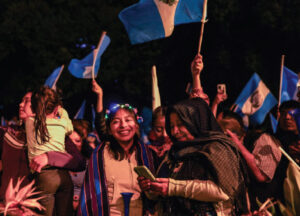
Civil Society, Democracy, Featured, Global, Global Governance, Headlines, Human Rights, IPS UN: Inside the Glasshouse, Latin America & the Caribbean, Press Freedom, TerraViva United Nations

Credit: Freedom House
– At least 55 governments in the past decade have restricted the freedom of movement for people they deem as threats, including journalists, according to a Freedom House report published last Thursday.
Governments control freedom of movement via travel bans, revoking citizenship, document control and denial of consular services, the report found. All the tactics are designed to coerce and punish government critics, according to Jessica White, the report’s London-based co-author.
“This is a type of tactic that really shows the vindictive and punitive nature of some countries,” White said. This form of repression “is an attempt to really stifle peoples’ ability to speak out freely from wherever they are.”
Belarus, China, India, Nicaragua, Russia, Rwanda and Saudi Arabia are among the countries that engage in this form of repression, the report found. Freedom House based its findings in part on interviews with more than 30 people affected by mobility controls.
Travel bans are the most common tactic, according to White, with Freedom House identifying at least 40 governments who prevent citizens leaving or returning to the country.
Revoking citizenship is another strategy, despite being prohibited by international law. The Nicaraguan government in 2023 stripped more than 200 political prisoners of their citizenship shortly after deporting them to the United States.
Among them were Juan Lorenzo Holmann, head of Nicaragua’s oldest newspaper, La Prensa. “It is as if I do not exist anymore. It is another attack on my human rights,” he told VOA after being freed. “But you cannot do away with the person’s personality. In the Nicaraguan constitution, it says that you cannot wipe out a person’s personal records or take away their nationality. I feel Nicaraguan, and they cannot take that away from me.”
Before being expelled from his own country, Lorenzo had spent 545 days in prison, in what was widely viewed as a politically motivated case.
Blocking access to passports and other travel documents is another tactic. In one example, Hong Kong in June canceled the passports of six pro-democracy activists who were living in exile in Britain.
In some cases, governments refuse to issue people passports to trap them in the country. And in cases where the individual is already abroad, embassies deny passport renewals to block the individual from traveling anywhere, including back home.
Myanmar’s embassy in Berlin, for instance, has refused to renew the passport of Ma Thida, a Burmese writer in exile in Germany. Ma Thida told VOA earlier this year she believes the refusal is in retaliation for her writing.
White said Ma Thida’s case was a classic example of mobility restrictions. For now, the German government has issued a passport reserved for people who are unable to obtain a passport from their home country — which White applauded but said is still rare.
“Our ability to freely leave and return to our home country is something that in democratic societies, people often take for granted. It’s one of our fundamental human rights, but it’s one that is being undermined and violated across many parts of the world,” White said.
Mobility restrictions can have devastating consequences, including making it difficult to work, travel and visit family. What makes matters even worse is the emotional toll, according to White.
“There is a huge psychological impact,” White said. “A lot of our interviewees mention especially the pain of being separated from family members and not being able to return to their country.”
In the report, Freedom House called on democratic governments to impose sanctions on actors that engage in mobility controls.
White said that democratic governments should do more to help dissidents, including by providing them with alternative travel documents if they can’t obtain them from their home countries.
https://freedomhouse.org/sites/default/files/2024-02/FIW_2024_DigitalBooklet.pdf
Source: Voice of America (VOA)
IPS UN Bureau




